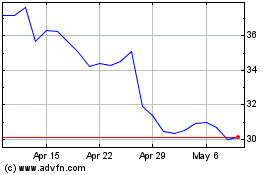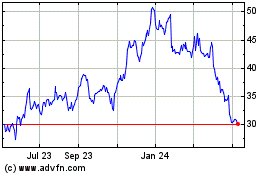By Paul Page
Sign up:With one click, get this newsletter delivered to your
inbox.
The expanded Panama Canal is already having an impact on U.S.
trade. The first shipment of liquefied natural gas from the U.S. to
China arrived at a Yantian shipping terminal this week, the WSJ's
Jenny Hsu reports, effectively opening a new market for
U.S.-produced LNG. The U.S. export opening comes even as the
expanded canal's impact on imports remains under debate. For the
energy business, however, the results are clear: U.S. LNG has not
been able to compete in Asia because the large ships that haul the
gas can't fit through the older Panama Canal locks. The new locks
will cut travel time by about a third, to 20 days, and slash
transportation costs, rewriting the financial equation for LNG
exports to Asia. The opening comes at the right time for the LNG
field. China wants to increase the role of natural gas, and LNG
imports were up 21% in the first six months of the year, with most
supplies coming from Australia and Qatar.
There appears to be no shortage on world textile markets of
goods labeled "Egyptian cotton" even as production has waned. The
contradiction is at the heart of a spreading controversy as
Wal-Mart Stores Inc., Target Corp. and other big U.S. retailers
question whether one of India's biggest textile companies has been
supplying these stores with phony Egyptian cotton sheets. In fact,
Egypt produced less than 1% of the global cotton supply last year,
the WSJ's Sarah Nussauer and Preetika Nana report, and output has
fallen by a third over the last 10 years as the country has faced
political and economic upheaval. The questions over the cotton that
have hit provider Welspun India Ltd. highlight the fault line
between retail marketing and the deeper recesses of supply chains,
where the premium prices behind some big brands run into the
practical reality of supplies. The Cotton Egypt Association, which
certifies suppliers, says it is cracking down on knockoffs, but the
group concedes that 90% of products labeled "Egyptian cotton" are
in fact fakes.
Some tech-equipment providers are trying to break Intel Corp.'s
dominance as a semiconductor supplier . International Business
Machines Corp. and Advanced Micro Devices Inc. are among several
companies talking up new chip production, responding to what the
WSJ's Don Clark reports is a call by some of the world's biggest
technology companies for more market choices. Some big buyers of
servers that use the powerful Intel chips to back their massive
data-center operations -- including Facebook Inc. and Alphabet
Inc.'s Google -- are among those pushing for alternatives. Rival
chip providers face a steep challenge: of the 9.81 million servers
shipped last year, 98% used x86-based chips -- Intel's flagship
line. The semiconductors also carry a big 49% profit margin for
Intel, which must figure into the call by Intel's customers for
more competition in the chip business.
TRANSPORTATION
China's state-owned shipbuilding giant is looking for financial
growth outside the troubled shipping business. China State
Shipbuilding Corp. is close to pledging it will buy $2 billion
worth of shares in the planned $7 billion-plus initial public
offering of Postal Savings Bank of China Corp. in Hong Kong, the
WSJ's Alec MacFarlane and Julie Steinberg report. The IPO is
expected to be the world's biggest this year, and the China State
Shipbuilding commitment is likely to be one of several
"cornerstone" investments that are coming mostly from Chinese
state-owned enterprises. It also highlights how China's sprawling
state-owned conglomerates are casting around for new places to put
their money. China State Shipbuilding has diversified into areas
such as real estate, bridge construction, steel-manufacturing and
financing. Rival state-owned China Shipbuilding Industry Corp. also
has branched out, and now gets more than half its revenues outside
shipbuilding operations.
QUOTABLE
IN OTHER NEWS
The eurozone's economic recovery gained a little speed in
August, according to surveys of purchasing managers. (WSJ)
Germany's economic growth slowed in the second quarter as
business investment tailed off. (WSJ)
Sales of previously owned homes slipped in July. (WSJ)
A top U.S. House Republican will release a plan aimed at set a
new framework for taxing cross-border retail sales, a key
e-commerce sticking point. (WSJ)
Express Inc. slashed its forecast for the year as the apparel
chain reported sliding sales, including a 7% decline in e-commerce
business. (WSJ)
Qantas Airways Ltd. reported an 85% gain in net profit for the
year through June as a big cost-cutting effort paid off. (WSJ)
SAIC Motor Corp., China's biggest auto maker, reported a 6%
increase in first-half net profit. (WSJ)
Airlines are investing heavily in radio-frequency identification
tags and mobile apps to better track luggage and give passengers
information on their baggage. (WSJ)
A bankruptcy judge is preparing to rule on a dispute between
Aeropostale Inc. and its former financial backer that could send
the apparel retailer into liquidation. (WSJ)
The U.S. Federal Maritime Commission will ask for more
information on the Ocean Alliance shipping group, effectively
pushing back a decision on regulatory approval. (MarineLink)
Federal investigators recovered 26 hours of information,
including navigation bridge audio, from the data recorder of the
sunken El Faro cargo ship. (Florida Times-Union)
FedEx Corp. and United Parcel Service Inc. have raised published
ground-parcel prices at an identical rate over the last 10 years,
according to a consultant's analysis. (DC Velocity)
FedEx signed a five-year agreement with Atlas Air Worldwide
Holdings Inc. for peak-season air transport using 747 freighters.
(Air Cargo News)
All Nippon Airways will reduce its freighter schedule in October
amid declining demand from China and Southeast Asia auto production
sites. (Nikkei Asian Review)
G6 container shipping alliance members will eliminate some
Asia-North Europe services due to "the expected low demand in
October." (The Loadstar)
Industrial parts distributor MRC Global Inc. will scale back its
Australia operations, citing the downturn in energy and mining
business. (Industrial Distribution)
Indian e-commerce marketplace Flipkart launched an "Assured"
service to compete with Amazon Prime. (Business Standard)
ABOUT US
Paul Page is deputy editor of WSJ Logistics Report. Follow him
at @PaulPage, and follow the entire WSJ Logistics Report team:
@brianjbaskin, @lorettachao, @RWhelanWSJ and @EEPhillips_WSJ, and
follow the WSJ Logistics Report on Twitter at @WSJLogistics.
Subscribe to this email newsletter by clicking here:
http://on.wsj.com/Logisticsnewsletter .
Write to Paul Page at paul.page@wsj.com
(END) Dow Jones Newswires
August 25, 2016 06:51 ET (10:51 GMT)
Copyright (c) 2016 Dow Jones & Company, Inc.
Intel (NASDAQ:INTC)
Historical Stock Chart
From Mar 2024 to Apr 2024

Intel (NASDAQ:INTC)
Historical Stock Chart
From Apr 2023 to Apr 2024
